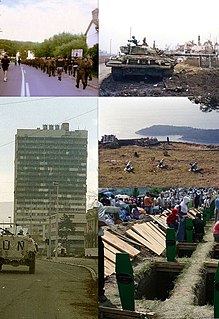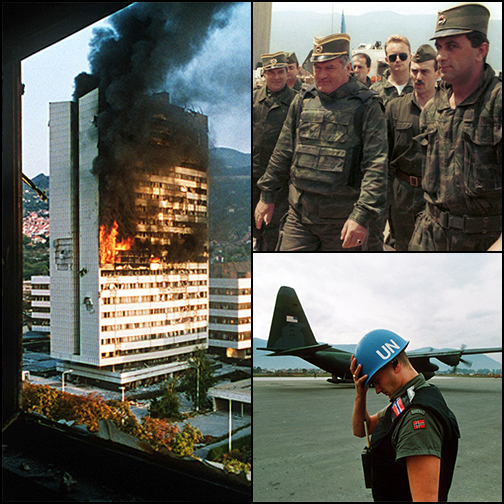
Serbo-Croatian is a South Slavic language and the primary language of Serbia, Croatia, Bosnia and Herzegovina, and Montenegro. It is a pluricentric language with four mutually intelligible standard varieties.

Yugoslavia was a country in Southeastern and Central Europe for most of the 20th century. It came into existence after World War I in 1918 under the name of the Kingdom of Serbs, Croats and Slovenes by the merger of the provisional State of Slovenes, Croats and Serbs with the Kingdom of Serbia, and constituted the first union of the South Slavic people as a sovereign state, following centuries in which the region had been part of the Ottoman Empire and Austria-Hungary. Peter I of Serbia was its first sovereign. The kingdom gained international recognition on 13 July 1922 at the Conference of Ambassadors in Paris. The official name of the state was changed to Kingdom of Yugoslavia on 3 October 1929.

Dalmatia is one of the four historical regions of Croatia, alongside Croatia proper, Slavonia, and Istria.

Dubrovnik is a Croatian city on the Adriatic Sea. It is one of the most prominent tourist destinations in the Mediterranean Sea, a seaport and the centre of Dubrovnik-Neretva County. Its total population is 42,615. In 1979, the city of Dubrovnik joined the UNESCO list of World Heritage sites.

Zagreb is the capital and the largest city of Croatia. It is located in the northwest of the country, along the Sava river, at the southern slopes of the Medvednica mountain. Zagreb lies at an elevation of approximately 122 m (400 ft) above sea level. The estimated population of the city in 2018 is 810,003. The population of the Zagreb urban agglomeration is about 1.2 million, approximately a quarter of the total population of Croatia.

Croats or Croatians are a nation and South Slavic ethnic group native to Croatia. Croats mainly live in Croatia and Bosnia and Herzegovina, but are also recognized minorities in such countries as Austria, the Czech Republic, Germany, Hungary, Italy, Montenegro, Romania, Serbia, Slovakia, and Slovenia.

The Ustaša – Croatian Revolutionary Movement, commonly known as Ustaše, was a Croatian fascist, racist, ultranationalist and terrorist organization, active, as one organization, between 1929 and 1945. Its members murdered hundreds of thousands of Serbs, Jews, and Roma as well as political dissidents in Yugoslavia during World War II.

The Independent State of Croatia was a World War II fascist puppet state of Germany and Italy. It was established in parts of occupied Yugoslavia on 10 April 1941, after the invasion by the Axis powers. Its territory consisted of most of modern-day Croatia and Bosnia and Herzegovina, as well as some parts of modern-day Serbia and Slovenia, but also excluded many Croat-populated areas in Dalmatia, Istria, and Međimurje regions.

The Federation of Bosnia and Herzegovina is one of the two political entities that compose Bosnia and Herzegovina, the other being Republika Srpska. The Federation of Bosnia and Herzegovina consists of 10 autonomous cantons with their own governments. It is inhabited primarily by Bosniaks and Bosnian Croats, which is why it is sometimes informally referred to as the Bosniak-Croat Federation. It is sometimes known by the shorter name Federation of B&H.

The Croatian Parliament or the Sabor is the unicameral representative body of the citizens of the Republic of Croatia; it is Croatia's legislature. Under the terms of the Croatian Constitution, the Sabor represents the people and is vested with legislative power. The Sabor is composed of 151 members elected to a four-year term on the basis of direct, universal and equal suffrage by secret ballot. Seats are allocated according to the Croatian Parliament electoral districts: 140 members of the parliament are elected in multi-seat constituencies, 8 from the minorities and 3 from the Croatian diaspora. The Sabor is presided over by a Speaker, who is assisted by at least one deputy speaker.

The Yugoslav Wars were a series of separate but related ethnic conflicts, wars of independence and insurgencies fought in the former Yugoslavia from 1991 to 2001, which led to the breakup of the Yugoslav state. Its constituent republics declared independence, despite unresolved tensions between ethnic minorities in the new countries, fueling the wars.

The Bosnian War was an international armed conflict that took place in Bosnia and Herzegovina between 1992 and 1995. Following a number of violent incidents in early 1992, the war is commonly viewed as having started on 6 April 1992. The war ended on 14 December 1995. The main belligerents were the forces of the Republic of Bosnia and Herzegovina and those of the self-proclaimed Bosnian Serb and Bosnian Croat entities within Bosnia and Herzegovina, Republika Srpska and Herzeg-Bosnia, which were led and supplied by Serbia and Croatia, respectively.

The kuna is the currency of Croatia, in use since 1994. It is subdivided into 100 lipa. The kuna is issued by the Croatian National Bank and the coins are minted by the Croatian Monetary Institute.

The Croatia national football team represents Croatia in international association football matches. The team is controlled by the Croatian Football Federation (HNS), the nation's governing body for football, and is widely supported throughout the country due to the ever-present popularity of the sport. Most home matches are played at the Stadion Maksimir in Zagreb or though other smaller venues are also used occasionally. They are one of the youngest national teams to reach the knockout stage of a major tournament, as well as the youngest team to occupy the top 10 in the FIFA World Rankings.

The Breakup of Yugoslavia occurred as a result of a series of political upheavals and conflicts during the early 1990s. After a period of political and economic crisis in the 1980s, constituent republics of the Socialist Federal Republic of Yugoslavia split apart, but the unresolved issues caused bitter inter-ethnic Yugoslav wars. The wars primarily affected Bosnia and Herzegovina, neighboring parts of Croatia and some years later, Kosovo.

The Croatian War of Independence was fought from 1991 to 1995 between Croat forces loyal to the government of Croatia—which had declared independence from the Socialist Federal Republic of Yugoslavia (SFRY)—and the Serb-controlled Yugoslav People's Army (JNA) and local Serb forces, with the JNA ending its combat operations in Croatia by 1992. In Croatia, the war is primarily referred to as the "Homeland War" and also as the "Greater-Serbian Aggression". In Serbian sources, "War in Croatia" and "War in Krajina" are used.

The counties of Croatia are the primary administrative subdivisions of the Republic of Croatia. Since they were re-established in 1992, Croatia has been divided into 20 counties and the capital city of Zagreb, which has the authority and legal status of both a county and a city. As of 2015, the counties are subdivided into 128 cities and 428 municipalities.

Croatian is the standardized variety of the Serbo-Croatian language used by Croats, principally in Croatia, Bosnia and Herzegovina, the Serbian province of Vojvodina, and other neighboring countries. It is the official and literary standard of Croatia and one of the official languages of the European Union. Croatian is also one of the official languages of Bosnia and Herzegovina and a recognized minority language in Serbia and neighboring countries.

Građanski nogometni klub Dinamo Zagreb, commonly referred to as GNK Dinamo Zagreb or simply Dinamo Zagreb, is a professional Croatian football club based in Zagreb. The club was founded in 1911 as 1. HŠK Građanski or fully Prvi hrvatski građanski športski klub, 1945 changed name to Dinamo Zagreb. They play their home matches at Stadion Maksimir. They are the most successful club in Croatian football, having won 20 Croatian Football League titles, 15 Croatian Football Cups and five Croatian Football Super Cups. The club has spent its entire existence in top flight, having been members of the Yugoslav First League from 1946 to 1991, and then the Croatian First League since its foundation in 1992.



















